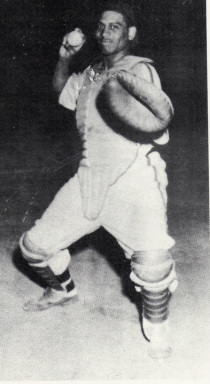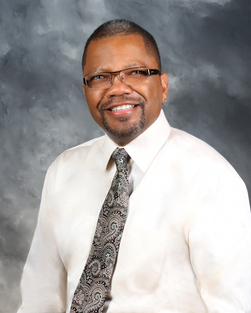Bill 'Ready' Cash

William Walker “Ready” Cash Sr., born February 21,1919, in Round Oak, Georgia, was a powerhouse catcher for the Philadelphia Stars of the Negro Leagues from 1943 to 1950. He also played in Cuba, the Dominican Republic, Mexico, Venezuela, and Canada. When Bill came to Philadelphia with his mother and brothers to join his father in 1924, they were southern ragamuffins escaping a dismal farming life in Georgia.
Poor and new to the city, the Cashes ate white potatoes and ribs and dug up wooden railroad ties to burn for heat. But soon young Bill and his brothers discovered baseball, and playing with cobbled bats and balls wrapped with packing tape, they challenged all comers in Elmwood, their diverse neighborhood.
Baseball became Bill’s passion. Nicknamed “Ready” because he was always ready to play ball, Bill dropped out of Ovebrook High School to work and help the family. In 1943 he joined the Stars and played for them for seven years -- going against the likes of Josh Gibson, Satchel Paige, Larry Doby, and Roy Campanella. He built a reputation as one of the league’s best catchers and was named to the prestigious East-West All-Star Team in 1948 and 1949. “If I could catch, hit and throw like you,” white catcher Clint “Scrap Iron” Courtney once told Bill, “I’d be the greatest thing the American League ever had.”
But Bill’s chance to make it to the majors was stymied, some say, by a controversial play in 1946 where he accidentally clipped a white umpire. And Bill believes he was blackballed by the Chicago White Sox organization after he refused to cooperate with them. He didn’t take kindly to liars.
Bill’s talents were also displayed in other countries, including Cuba (Almendares, Marianao),the Dominican Republic (Licey, Santiago), Mexico (Mexico City, Culiacan, Obregon, Hermosillo), Venezuela (Vargas), Canada (Granby, Brandon-Manitoba), and remote parts of the United States in the 1940s through and ‘50s. During his travels, Bill faced racism: he couldn’t eat in certain restaurants, or sleep in the same hotel as his white roommates – even though he was the team’s best player.
Bill, who also participated in the 1960s civil rights movement, was the father of three children, Bill Jr., Janet (deceased), and Michael. He is enshrined in three local halls of fame. Bill was a Shriner, a member of the First African Baptist Church of Darby Township, Pa., and 33rd-degree Prince Hall Mason. He was married for 63 years to his wife, Sadie, who passed in 2003. Bill did not live to see his autobiography published. He died from pneumonia on September 12, 2011, three months before his book came out. He was 92.
Poor and new to the city, the Cashes ate white potatoes and ribs and dug up wooden railroad ties to burn for heat. But soon young Bill and his brothers discovered baseball, and playing with cobbled bats and balls wrapped with packing tape, they challenged all comers in Elmwood, their diverse neighborhood.
Baseball became Bill’s passion. Nicknamed “Ready” because he was always ready to play ball, Bill dropped out of Ovebrook High School to work and help the family. In 1943 he joined the Stars and played for them for seven years -- going against the likes of Josh Gibson, Satchel Paige, Larry Doby, and Roy Campanella. He built a reputation as one of the league’s best catchers and was named to the prestigious East-West All-Star Team in 1948 and 1949. “If I could catch, hit and throw like you,” white catcher Clint “Scrap Iron” Courtney once told Bill, “I’d be the greatest thing the American League ever had.”
But Bill’s chance to make it to the majors was stymied, some say, by a controversial play in 1946 where he accidentally clipped a white umpire. And Bill believes he was blackballed by the Chicago White Sox organization after he refused to cooperate with them. He didn’t take kindly to liars.
Bill’s talents were also displayed in other countries, including Cuba (Almendares, Marianao),the Dominican Republic (Licey, Santiago), Mexico (Mexico City, Culiacan, Obregon, Hermosillo), Venezuela (Vargas), Canada (Granby, Brandon-Manitoba), and remote parts of the United States in the 1940s through and ‘50s. During his travels, Bill faced racism: he couldn’t eat in certain restaurants, or sleep in the same hotel as his white roommates – even though he was the team’s best player.
Bill, who also participated in the 1960s civil rights movement, was the father of three children, Bill Jr., Janet (deceased), and Michael. He is enshrined in three local halls of fame. Bill was a Shriner, a member of the First African Baptist Church of Darby Township, Pa., and 33rd-degree Prince Hall Mason. He was married for 63 years to his wife, Sadie, who passed in 2003. Bill did not live to see his autobiography published. He died from pneumonia on September 12, 2011, three months before his book came out. He was 92.
Bill's career statistics:(Despite researchers' best efforts, Negro League statistics can be frustratingly inconsistent and incomplete.)
Al Hunter Jr.

Albert L. Hunter Jr. spent nearly thirty years in the newspaper business as an award-winning reporter, editor, jazz columnist, and editorial writer.
In his seventeen years at the Philadelphia Daily News, the city’s feisty tabloid, Al spent a decade covering the music industry, specifically jazz and R&B. In 2004, he joined the editorial board, where he shaped public opinion on issues such as education, violence, and the arts. He left the Daily News in September 2008, convinced that God had other plans for him. He's now a high school English teacher at Murrell Dobbins Career and Technical Education High School in North Philadelphia.
Al met Bill Cash in 1996 and spent hundreds of hours interviewing him -- mostly at his and Sadie’s dining room table in West Philadelphia -- and attended many of Bill's Negro League functions and personal appearances.
Al received his Bachelor of Arts in journalism in 1980 from Shippensburg State College (now Shippensburg University) and worked at newspapers in Indiana and Delaware before joining the Daily News as night city editor in 1991. In 1996, Al moved to the features department and covered the city’s jazz and R&B scene.
Al has made numerous presentations to children and community groups about journalism. For several years he served as a judge on the Philadelphia region’s Ronald McDonald House Charities/African American Future Achievers scholarship panel. He was an instructor at the Daily News’ Urban Journalism Workshop, where high school students learn how to report, write and publish a newspaper. He was an adjunct professor of journalism at Temple University, where during the summers of 2013 to 2015 he was a co-director and instructor for the university's high school journalism work shop. He was an instructor at the Dell East Music Business Institute. A jazz flutist, he volunteered as a music instructor once a week at the KIPP Philadelphia School in North Philadelphia and later taught Saturday School there.
Al has held several leadership positions with the Philadelphia Association of Black Journalists, including president from 1997 to 2001. He was editorial consultant for Grammy-award winning singer Dionne Warwick’s autobiography, My Life, as I See It, written with David Freeman Wooley. Al’s work has appeared in Down Beat and Heart & Soul magazines. He has written CD liner notes for the Prestige jazz label, Reika Records, and Four String Records. In 1999, he won first place in the Keystone Press Awards for a selection of his work with the Daily News. In 2004, he was presented with the Visions in Jazz Visionary Award for his writing, and in 2005 was inducted into the Chris’ Jazz Café Hall of Fame.
A voracious reader, music lover, and sports fan, Al lives in West Philadelphia.
In his seventeen years at the Philadelphia Daily News, the city’s feisty tabloid, Al spent a decade covering the music industry, specifically jazz and R&B. In 2004, he joined the editorial board, where he shaped public opinion on issues such as education, violence, and the arts. He left the Daily News in September 2008, convinced that God had other plans for him. He's now a high school English teacher at Murrell Dobbins Career and Technical Education High School in North Philadelphia.
Al met Bill Cash in 1996 and spent hundreds of hours interviewing him -- mostly at his and Sadie’s dining room table in West Philadelphia -- and attended many of Bill's Negro League functions and personal appearances.
Al received his Bachelor of Arts in journalism in 1980 from Shippensburg State College (now Shippensburg University) and worked at newspapers in Indiana and Delaware before joining the Daily News as night city editor in 1991. In 1996, Al moved to the features department and covered the city’s jazz and R&B scene.
Al has made numerous presentations to children and community groups about journalism. For several years he served as a judge on the Philadelphia region’s Ronald McDonald House Charities/African American Future Achievers scholarship panel. He was an instructor at the Daily News’ Urban Journalism Workshop, where high school students learn how to report, write and publish a newspaper. He was an adjunct professor of journalism at Temple University, where during the summers of 2013 to 2015 he was a co-director and instructor for the university's high school journalism work shop. He was an instructor at the Dell East Music Business Institute. A jazz flutist, he volunteered as a music instructor once a week at the KIPP Philadelphia School in North Philadelphia and later taught Saturday School there.
Al has held several leadership positions with the Philadelphia Association of Black Journalists, including president from 1997 to 2001. He was editorial consultant for Grammy-award winning singer Dionne Warwick’s autobiography, My Life, as I See It, written with David Freeman Wooley. Al’s work has appeared in Down Beat and Heart & Soul magazines. He has written CD liner notes for the Prestige jazz label, Reika Records, and Four String Records. In 1999, he won first place in the Keystone Press Awards for a selection of his work with the Daily News. In 2004, he was presented with the Visions in Jazz Visionary Award for his writing, and in 2005 was inducted into the Chris’ Jazz Café Hall of Fame.
A voracious reader, music lover, and sports fan, Al lives in West Philadelphia.
